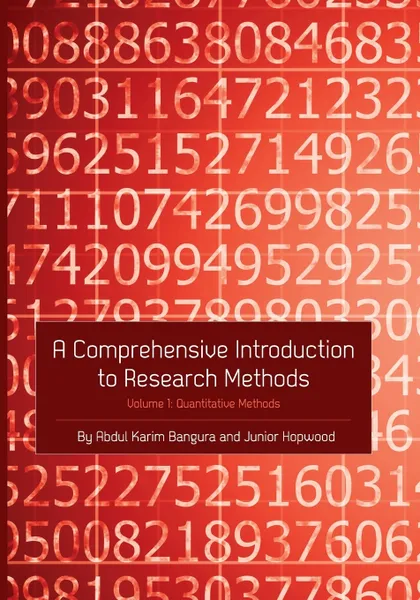A Comprehensive Introduction to Research Methods (Volume 1). Quantitative Methods
Автор: Abdul Karim Bangura,
Junior Hopwood
2013
Переплёт: Мягкая обложка, 160 страниц
ISBN: 9781609278540
📘 A Comprehensive Guide to Research Methods, Volume One provides a clear overview of various methodologies of quantitative research. Each chapter defines and describes a specific methodology and introduces readers to those who pioneered it. Applications of each methodology are discussed, its strengths and weaknesses are explored, and references for further study are provided.
Students will learn about achievement testing methodology, agent-based models, calculus for the social sciences, and chaos and catastrophe theories. They will also become familiar with content analysis, linear programming, matrix algebra, and metric scaling.
In all, twenty diverse research methods, ranging from internet data collection to multivariate analysis of variance, are effectively explained and analyzed, exposing readers to the fundamentals of each, and creating a pathway for deeper study.
A Comprehensive Guide to Research Methods is recommended for use in undergraduate courses focusing on research methodologies in the social sciences.
Abdul Karim Bangura holds Ph.D.s in political science, development economics, linguistics, computer science, and mathematics. Dr. Bangura is a professor of research methodology and political science at Howard University, and a researcher-in-residence at the Center for Global Peace in the School of International Service at American University. The author of 70 books and over 600 scholarly articles, Dr. Bangura won the prestigious 2012 Cecil B. Curry Book Award for African Mathematics: From Bones to Computers.Junior Hopwood is an Assistant Professor of Sociology and Chair of the Department of Social Sciences at the University of Maryland Eastern Shore. He is a member of the Permanent Organization and Strategic Planning Committee for the Society of the Study of Social Problems, and the author of HIV/AIDS in Sub-Sahara Africa: Control Through Innovative Stress Management Approaches.
Students will learn about achievement testing methodology, agent-based models, calculus for the social sciences, and chaos and catastrophe theories. They will also become familiar with content analysis, linear programming, matrix algebra, and metric scaling.
In all, twenty diverse research methods, ranging from internet data collection to multivariate analysis of variance, are effectively explained and analyzed, exposing readers to the fundamentals of each, and creating a pathway for deeper study.
A Comprehensive Guide to Research Methods is recommended for use in undergraduate courses focusing on research methodologies in the social sciences.
Abdul Karim Bangura holds Ph.D.s in political science, development economics, linguistics, computer science, and mathematics. Dr. Bangura is a professor of research methodology and political science at Howard University, and a researcher-in-residence at the Center for Global Peace in the School of International Service at American University. The author of 70 books and over 600 scholarly articles, Dr. Bangura won the prestigious 2012 Cecil B. Curry Book Award for African Mathematics: From Bones to Computers.Junior Hopwood is an Assistant Professor of Sociology and Chair of the Department of Social Sciences at the University of Maryland Eastern Shore. He is a member of the Permanent Organization and Strategic Planning Committee for the Society of the Study of Social Problems, and the author of HIV/AIDS in Sub-Sahara Africa: Control Through Innovative Stress Management Approaches.
Мнения
